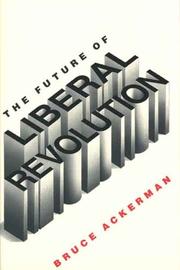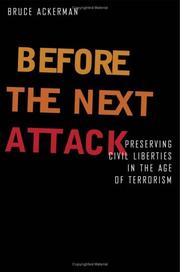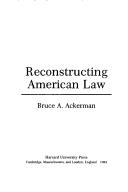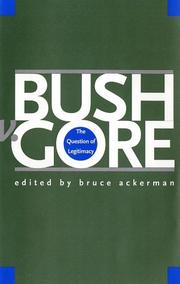| Listing 1 - 10 of 31 | << page >> |
Sort by
|

ISBN: 0300053967 Year: 1992 Publisher: New Haven Yale University Press
Abstract | Keywords | Export | Availability | Bookmark
 Loading...
Loading...Choose an application
- Reference Manager
- EndNote
- RefWorks (Direct export to RefWorks)
Construction de l'Europe --- Construction européenne --- Europe de l'Ouest--Unité --- Europe--Intégration --- Europe--Intégration politique --- Europe--Organisation économique et politique --- Europe--Unité --- European federation --- Europese eenmaking --- Europese federatie --- Europese integratie --- Fédération européenne --- Intégration européenne --- Intégration politique européenne --- Liberalism --- Liberalisme --- Libéralisme --- Unification de l'Europe --- Unification européenne --- Unité européenne --- Constitutional law --- European federation. --- Justice, Administration of --- Liberalism. --- Estados Unidos da Europa --- Europe -- Fédération --- Europe -- Intégration --- Europe -- Intégration politique --- Europe -- Organisation économique et politique --- European state --- Federation of Europe --- Fédéralisme européen --- Pan Europa movement --- Paneuropean federation --- United States of Europe (Proposed) --- Vereinigten Staaten von Europa --- Verenigde Staten van Europa --- États-Unis d'Europe --- Europe [Eastern ] --- Justice [Administration of ] --- Europe --- Politics and government --- 1989 --- -Justice, Administration of - Europe, Eastern. --- Europe - Politics and government - 1989 --- -Constitutional law --- Justice, Administration of - Europe, Eastern. --- Europe - Politics and government - 1989-

ISBN: 0674018664 Year: 2005 Publisher: Cambridge MIT press
Abstract | Keywords | Export | Availability | Bookmark
 Loading...
Loading...Choose an application
- Reference Manager
- EndNote
- RefWorks (Direct export to RefWorks)
Constitutional history --- Federal government --- Presidents --- Separation of powers --- History --- Jefferson, Thomas --- Marshall, John, --- United States. --- Supreme Court (U.S.) --- Chief Justice of the United States --- Supreme Court of the United States --- 美國. --- History. --- United States --- Politics and government --- 1801-1809 --- 1797-1801 --- Marshall, John --- United States. Supreme Court --- Constitutional law --- Founding Fathers of the United States

ISBN: 0300112890 9780300112894 Year: 2006 Publisher: New Haven London Yale University Press
Abstract | Keywords | Export | Availability | Bookmark
 Loading...
Loading...Choose an application
- Reference Manager
- EndNote
- RefWorks (Direct export to RefWorks)
Terrorist attacks regularly trigger the enactment of repressive laws, setting in motion a vicious cycle that threatens to devastate civil liberties over the twenty-first century. In this clear-sighted book, Bruce Ackerman peers into the future and presents an intuitive, practical alternative. He proposes an & emergency constitution& that enables government to take extraordinary actions to prevent a second strike in the short run while' 'prohibiting permanent measures that destroy our freedom over the longer run. Ackerman's & emergency constitution& exposes the dangers lurking behind the popular notion that we are fighting a & war& on terror. He criticizes court opinions that have adopted the war framework, showing how they uncritically accept extreme presidential claims to sweeping powers. Instead of expanding the authority of the commander in chief, the courts should encourage new forms of checks and balances that allow for decisive, but carefully controlled, presidential action during emergencies. In making his case, Ackerman explores emergency provisions in constitutions of nations ranging from France to South Africa, retaining aspects that work and adapting others. He shows that no country today is well equipped to both fend off terrorists and preserve fundamental liberties, drawing particular attention to recent British reactions to terrorist attacks. Written for thoughtful citizens throughout the world, this book is democracy's constitutional reply to political excess in the sinister era of terrorism.
Terrorism --- War and emergency legislation --- War on Terrorism, 2001 --- -Civil rights --- Terrorisme --- Mesures d'exception --- Droits de l'homme --- Law and legislation --- -Prevention --- United States --- War on Terrorism, 2001-2009
Book
ISBN: 0300020651 Year: 1977 Publisher: New Haven, CT ; London : Yale University Press,
Abstract | Keywords | Export | Availability | Bookmark
 Loading...
Loading...Choose an application
- Reference Manager
- EndNote
- RefWorks (Direct export to RefWorks)
Eminent domain --- Property --- Constitutional law --- Expropriation --- Propriété --- Droit constitutionnel --- 342.739 --- -Property --- -Constitutional law --- Constitutional limitations --- Constitutionalism --- Constitutions --- Limitations, Constitutional --- Public law --- Administrative law --- Economics --- Possession (Law) --- Things (Law) --- Wealth --- Compulsory purchase (Eminent domain) --- Condemnation of land --- Domain, Eminent --- Land, Condemnation of --- Takings (Eminent domain) --- Land use --- Right of property --- Angary, Right of --- Onschendbaarheid van de eigendom --- Interpretation and construction --- Law and legislation --- -Onschendbaarheid van de eigendom --- 342.739 Onschendbaarheid van de eigendom --- -342.739 Onschendbaarheid van de eigendom --- Propriété --- Economic liberties (U.S. Constitution) --- Biens (droit)
Book
ISBN: 0300024398 0300027575 9780300024395 Year: 1980 Publisher: New Haven (Conn.) Yale university
Abstract | Keywords | Export | Availability | Bookmark
 Loading...
Loading...Choose an application
- Reference Manager
- EndNote
- RefWorks (Direct export to RefWorks)
Liberalism --- Justice --- 340.1 --- 342.2 --- Liberal egalitarianism --- Liberty --- Political science --- Social sciences --- Injustice --- Conduct of life --- Law --- Common good --- Fairness --- Rechtstelsels: soorten en vormen --- Staatsvormen --- Justice. --- Liberalism. --- 342.2 Staatsvormen --- 340.1 Rechtstelsels: soorten en vormen --- democratie --- liberalisme (algemeen) --- sociale kwestie

ISBN: 0674750160 0674750152 9780674750159 9780674750166 Year: 1984 Publisher: Cambridge (Mass.) : Harvard university press,
Abstract | Keywords | Export | Availability | Bookmark
 Loading...
Loading...Choose an application
- Reference Manager
- EndNote
- RefWorks (Direct export to RefWorks)
Law --- Lawyers --- Law and politics --- History --- United States --- Politics and government. --- Philosophy. --- Political aspects. --- Law - United States - History --- Lawyers - United States --- United States - Politics and government.

ISBN: 1281740632 9786611740634 0300127030 9780300127034 9780300112894 0300112890 9781281740632 Year: 2006 Publisher: New Haven Yale University Press
Abstract | Keywords | Export | Availability | Bookmark
 Loading...
Loading...Choose an application
- Reference Manager
- EndNote
- RefWorks (Direct export to RefWorks)
Terrorist attacks regularly trigger the enactment of repressive laws, setting in motion a vicious cycle that threatens to devastate civil liberties over the twenty-first century. In this clear-sighted book, Bruce Ackerman peers into the future and presents an intuitive, practical alternative. He proposes an "emergency constitution" that enables government to take extraordinary actions to prevent a second strike in the short run while prohibiting permanent measures that destroy our freedom over the longer run.Ackerman's "emergency constitution" exposes the dangers lurking behind the popular notion that we are fighting a "war" on terror. He criticizes court opinions that have adopted the war framework, showing how they uncritically accept extreme presidential claims to sweeping powers. Instead of expanding the authority of the commander in chief, the courts should encourage new forms of checks and balances that allow for decisive, but carefully controlled, presidential action during emergencies. In making his case, Ackerman explores emergency provisions in constitutions of nations ranging from France to South Africa, retaining aspects that work and adapting others. He shows that no country today is well equipped to both fend off terrorists and preserve fundamental liberties, drawing particular attention to recent British reactions to terrorist attacks. Written for thoughtful citizens throughout the world, this book is democracy's constitutional reply to political excess in the sinister era of terrorism.
Terrorism --- War and emergency legislation --- Prevention --- Law and legislation

ISBN: 1281740608 9786611740603 0300127006 9780300127003 9780300093797 0300093799 9780300093803 0300093802 Year: 2002 Publisher: New Haven Yale University Press
Abstract | Keywords | Export | Availability | Bookmark
 Loading...
Loading...Choose an application
- Reference Manager
- EndNote
- RefWorks (Direct export to RefWorks)
The Supreme Court's intervention in the 2000 election will shape American law and democracy long after George W. Bush has left the White House. This vitally important book brings together a broad range of preeminent legal scholars who address the larger questions raised by the Supreme Court's actions. Did the Court's decision violate the rule of law? Did it inaugurate an era of super-politicized jurisprudence? How should Bush v. Gore change the terms of debate over the next round of Supreme Court appointments?The contributors-Bruce Ackerman, Jack Balkin, Guido Calabresi, Steven Calabresi, Owen Fiss, Charles Fried, Robert Post, Margaret Jane Radin, Jeffrey Rosen, Jed Rubenfeld, Cass Sunstein, Laurence Tribe, and Mark Tushnet-represent a broad political spectrum. Their reactions to the case are varied and surprising, filled with sparkling argument and spirited debate. This is a must-read book for thoughtful Americans everywhere.
Presidents --- Contested elections --- Election --- Bush, George W. --- Gore, Al, --- Gore, Albert --- Bush, George, --- Bush, Geo, --- Bush, Dzhordzh Uoker, --- Bush, Dzh. U. --- Bush, Dzh. --- Bush, --- Bushi, Qiaozhi W., --- Bush, Zhorzh, --- Arbusto, Jorge W., --- Bush, Xhorxh W., --- Gore, Albert, --- Gore, Albert Arnold, --- Гор, Ал, --- Гор, Альберт, --- Bush, George Walker, 1946 --- -Trials, litigation, etc. --- Trials, litigation, etc. --- United States --- 2000 --- Florida

ISBN: 0300158084 9780300158083 0300053967 9780300053968 9780300058987 0300058985 Year: 1992 Publisher: New Haven : Yale University Press,
Abstract | Keywords | Export | Availability | Bookmark
 Loading...
Loading...Choose an application
- Reference Manager
- EndNote
- RefWorks (Direct export to RefWorks)
Since 1989, the Cold War has ended, new nations have emerged in Eastern Europe, and revolutionary struggles to establish liberal ideals have been waged against repressive governments throughout the world. Will the promise of liberalism be realized? What can liberals do to make the most of their opportunities and construct enduring forms of political order? In this important and timely book, a leading political theorist discusses the possibility of liberal democracy in Western and Eastern Europe and offers practical suggestions for its realization. Bruce Ackerman begins by sketching the challenges faced a Western Europe free for the first time in half a century to determine its own fate without the constant intervention of the United States and the Soviet Union. Unless decisive steps are taken, this moment of promise can degenerate into a new cycle of nationalist power struggle. Revolutionary action is now required to build the foundations of a democratic federal Europe-a union strong enough to keep the peace and to combat the threat of local tyrannies. Ackerman next considers Eastern Europe and discusses fundamental problems overlooked in the rush to build market economies there. He points out that leading countries-including Poland, Hungary, and Russia-have yet to establish new constitutions, contenting themselves instead with hasty amendments to old Communist documents. This is a great mistake, says Ackerman, for there is an urgent need to constitutionalize liberal revolution, and the window of opportunity for doing this is far smaller than many people realize. Neither judicial efforts to punish collaborators with the old regimes and to redress wrongs done to their victims nor the judicial activism now sweeping Eastern Europe should take priority over the formulation of democratically legitimated constitutions. Ackerman concludes by considering the impact of 1989 on South Africa, Latin America, and the United States, exploring how decisive liberal action throughout the world can help to expand the range of functioning constitutional democracies and recover liberalism's lost revolutionary heritage.
Constitutional law --- European federation. --- Justice, Administration of --- Liberalism. --- Liberal egalitarianism --- Liberty --- Political science --- Social sciences --- Administration of justice --- Law --- Courts --- Federation of Europe --- Pan Europa movement --- Paneuropean federation --- United States of Europe (Proposed) --- Federal government --- Regionalism (International organization) --- Constitutional limitations --- Constitutionalism --- Constitutions --- Limitations, Constitutional --- Public law --- Administrative law --- Law and legislation --- Interpretation and construction --- Europe --- Politics and government
Book
ISBN: 0300158076 9780300158076 0300024398 9780300024395 0300027575 9780300027570 Year: 1980 Publisher: New Haven
Abstract | Keywords | Export | Availability | Bookmark
 Loading...
Loading...Choose an application
- Reference Manager
- EndNote
- RefWorks (Direct export to RefWorks)
Certain to become the most important work in political theory since John Rawls's A Theory of Justice, this book presents a brilliantly original, compelling vision of a just society-a world in which each of us may live his own life in his own way without denying the same right to others. Full of provocative discussions of issues ranging from education to abortion, it makes fascinating reading for anyone concerned with the future of the liberal democratic state.
Justice. --- Liberalism. --- Liberal egalitarianism --- Liberty --- Political science --- Social sciences --- Injustice --- Conduct of life --- Law --- Common good --- Fairness
| Listing 1 - 10 of 31 | << page >> |
Sort by
|

 Search
Search Feedback
Feedback About UniCat
About UniCat  Help
Help News
News